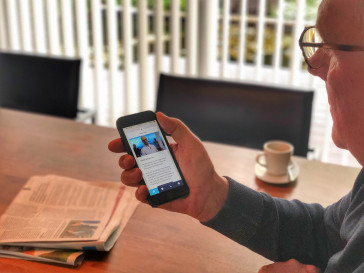E-health in de mondzorg. Is eHealth de sleutel tot een effectieve bijdrage aan de mondzorg bij thuiswonende ouderen? NTvM, januari 2017 , nummer 1
DOCUMENT

Er is een toename van het aanbod van e-health-toepassingen in Nederland, dat blijkt onder meer uit de e-health monitor 2016 (www.e-health-monitor.nl). Eén van de aanbevelingen uit deze monitor is dat meer onderzoek moet plaatsvinden naar veilige en effectieve e-health-toepassingen. In dit artikel bundelen onderzoekers van verschillende kenniscentra hun ervaringen en beschrijven de door hen geleerde lessen die zijn gebaseerd op diverse onderzoeksprojecten.
DOCUMENT

In deze literatuurstudie werden vier databanken doorzocht met behulp van trefwoorden zoals chronic disease, e-health, factors en suggested interventions. Kwalitatieve, kwantitatieve en mixed methods-studies werden meegenomen. Uit de data van de 22 artikelen die werden geïncludeerd in de studie, blijken leeftijd, geslacht, inkomen, opleidingsniveau, etnische achtergrond en woonplaats (stad of platteland) in meer of mindere mate van invloed te zijn op het gebruik van e-health. Het artikel is een Nederlandstalige samenvatting van het artikel: Reiners, Sturm, Bouw & Wouters (2019) uit Int J Environ Res Public Health 2019;16(4)
DOCUMENT

Het project Beter Voorbereid optimaliseert, onderzoekt en verduurzaamt de e-health applicatie BeterVoorbereid om het preoperatieve zorgtraject te ondersteunen. Goede voorbereiding is het halve werk. Dit geldt ook voor patiënten op de wachtlijst voor een chirurgische ingreep. Onderzoek laat zien dat een sneller herstel gerelateerd is aan een goede gezondheidsstatus voorafgaand aan een operatie. Het aanpassen van leefstijl en fysieke conditie voor een operatie is daarom effectief in het verbeteren van fysiek functioneren na de operatie. Het blijkt echter lastig om patiënten goed te informeren in de hectische periode voor een operatie. Onderzoek laat zien dat slechts 15% van de gegeven informatie wordt onthouden. Daarnaast is het voor tweedelijns fysiotherapeuten lastig om gepaste zorg te organiseren voor de patiënt in zijn/haar woonomgeving. Dit heeft er toe geleid dat vanuit de (ziekenhuis)fysiotherapie het initiatief is genomen om samen met MKB partijen op zoek te gaan naar een mogelijke oplossing. Uit dit initiatief is de app BeterVoorbereid voort gekomen. Deze app bevat gepaste adviezen om de leefstijl en fysieke conditie van patiënten te verbeteren, en een koppeling naar een platform waar eerstelijns fysiotherapeut hun expertise aanbieden voor aanvullende persoonlijke begeleiding. De eerste versie van de app is in 2019 in een pilot getest. Op basis van resultaten en feedback uit de pilot is de app verder gepersonaliseerd en is in juni 2020 gestart met de grootschalige multicenter RCT. Het onderzoek Beter Voorbereid richt zich op de randvoorwaarden voor een duurzame implementatie van de app en de daaraan gekoppelde zorg door 1) het personaliseren van de app, 2) het opzetten van een preoperatief netwerk, 3) onderzoek naar de effectiviteit op patiëntuitkomsten en 4) inzet op implementatie en businessmodellen van de innovatie. In alle werkpakketten wordt zowel onderwijs als de beroepspraktijk vanaf het begin van het project actief betrokken.
Een goede voorbereiding is het halve werk, ook voor patiënten op de wachtlijst voor een chirurgische ingreep. We onderzoeken hoe de e-health-applicatie 'Beter Voorbereid' mensen helpt om sterker aan de start van een operatie te staan en zo sneller te herstellen.

Een goede voorbereiding is het halve werk, ook voor patiënten op de wachtlijst voor een chirurgische ingreep. We onderzoeken hoe de e-health-applicatie 'Beter Voorbereid' mensen helpt om sterker aan de start van een operatie te staan en zo sneller te herstellen.Doel De e-health-applicatie Beter Voorbereid helpt patiënten om zich voor te bereiden op hun operatie. Ons onderzoek richt zich op de effectiviteit, verbetering en implementatie van de app met vier werkpakketten: Het optimaliseren van de app op basis van ervaringen van patiënten en zorgverleners. Het vormen van een netwerk van eerste- en tweedelijns zorgverleners die zorg voorafgaande aan een operatie bieden. Het onderzoeken van de effectiviteit van de app. Het opstellen van een implementatieplan, inclusief businessmodellen, van de app Beter Voorbereid. Resultaten Dit onderzoek loopt momenteel. Na afronding vind je hier een samenvatting van de resultaten. Lees meer over dit project op beter-voorbereid.nl. Looptijd 01 november 2018 - 01 januari 2023 Aanpak Binnen het Amsterdam UMC, locatie VUmc en het UMC Utrecht is een pilot gehouden naar de studieprocedures en bruikbaarheid van de applicatie. Naar aanleiding van deze resultaten worden verbeteringen doorgevoerd in de procedures van het onderzoek en de inhoud van de applicatie. Vervolgens zal in vier ziekenhuizen een groot Randomized Controlled Trial (RCT) starten naar de effectiviteit van de applicatie. Naast het Amsterdam UMC en UMC Utrecht zal dit ook plaatsvinden bij het Dijklander ziekenhuis in Hoorn. In deze periode zal ook het onderzoek naar de bredere implementatie van de app 'Beter Voorbereid' worden uitgevoerd.
Lectorate, part of NHL Stenden Hogeschool